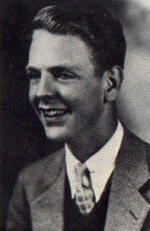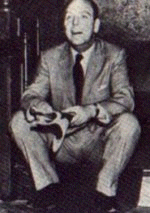-

Chapter 8: American Drama
William Motter Inge
1913-1973
Page Links: | Primary Works | Selected Bibliography 1980-Present | MLA Style Citation of this Web Page |
Site Links: | Chap. 8: Index | Alphabetical List | Table Of Contents | Home Page |


|
|
Chapter 8: American Drama
William Motter Inge
|
|
Page Links: | Primary Works | Selected Bibliography 1980-Present | MLA Style Citation of this Web Page |
Site Links: | Chap. 8: Index | Alphabetical List | Table Of Contents | Home Page |


Come back, little Sheba. NY: Random House 1950. PS3517.N265 C6Bus stop. NY: Random House 1955. PS3517 .N265 B8
4 plays: Come back, Little Sheba; Picnic; Bus stop; The dark at the top of the stairs. NY: Random House 1958. PS3517 .N265 F6
Splendor in the grass, a screenplay. NY: Bantam Books 1961. PS3517.N265 S6
Summer brave, and eleven short plays. NY: Random House 1962. PS3517.N265 P5
My son is a splendid driver; a novel. Boston, Little, Brown 1971. PS3517.N265 M9
Selected Bibliography 1980-Present
Adler, Stella. Stella Adler on America's Master Playwrights: Eugene O'Neill, Clifford Odets, Tennessee Williams, Arthur Miller, Edward Albee, et al. NY: Knopf, 2012.
Fahy, Thomas, and Kimball King. eds. Captive Audience: Prison and Captivity in Contemporary Theater. NY: Routledge, 2003.
Jenckes, Norma. ed. New Readings in American Drama: Something's Happening Here. NY: Peter Lang, 2002.
Johnson, Jeff and Jackson R Bryer. William Inge and the Subversion of Gender: Rewriting Stereotypes in the Plays, Novels, and Screenplays. Jefferson, NC: McFarland, 2005.
McClure, Arthur F. William Inge, a bibliography. NY: Garland Pub., 1982. Z8437.5 .M38
Shuman, R. Baird. William Inge. Boston: Twayne, 1989. PS3517 .N265 Z87
Voss, Ralph F. A life of William Inge: the strains of triumph. Lawrence, Kan.: UP of Kansas, 1989. PS3517 .N265 Z95
Wheatley, Christopher. ed. Twentieth-Century American Dramatists, Third Series. Detroit: Thomson Gale, 2002.
A Student Project by Douglas Puett
After William Inge died in 1973, he left behind a legacy of life that was rooted in the American Midwest. Whether the dramas are nostalgic recollections of the past or insights into Inge's own life, Ralph F. Voss says, "William Inge will always be legitimately known as America's first authentic midwestern playwright." (274) William Inge dramatized the heartland of America, and in doing so interjected parts of himself, and all of us, into a nostalgic slice of Americana. Small towns are the settings for most of Inge's plays, and Arthur F. McClure wrote "He [Inge] felt that 'people exist as individuals in small towns. Everybody knows everybody else's business, but not so in cities.'" (xiv)
William Inge was born in 1913 in Independence, Kansas. He was the fifth and last child Maude Sarah Gibson and Luther Clayton Inge. The small town of Independence is located thirteen miles from the Laura Ingalls Wilder homestead. Independence is the quaint stereotypical midwestern type of town that Inge would later use as a vehicle for his dramas. As an adolescent Inge converted a room of an old barn located behind the Inge house into a small theatre where he would cast himself in various roles, but was always careful to include other children from the neighborhood in his plays. Inge was viewed as a "mother's boy" by some of the other boys in the neighborhood, and as he grew older he often felt left out, so he played mostly by himself, or with the younger children in the neighborhood (Voss 4-21).
Inge entered high school in 1926, at the age of thirteen. This was a difficult age for Inge as he was becoming a man, but he did not have a strong male role model in his life. Older women at home surrounded Inge, and since he was not an athlete he was not exposed to a male coach. Virtually all of his teachers were female, and this experience helped him to forge his sensitivity with creating female characters later in life. These were difficult times for Inge, but there was always a promise of escape to a better place through acting. Inge was in many productions throughout high school, and seemed to have found his niche in life. Inge also immersed himself in literature that was beyond what was required in his English classes. His appreciation of writing styles would serve him well beyond his interest in acting (Voss 21-25).
In 1930 Inge attended the University of Kansas where he participated in many college productions. During the summers Inge toured in a Toby show, where he played many juvenile characters. The experience in college, and the tours prepared Inge for what R. Baird Shuman wrote that "He [Inge] came to look upon the day when he would be graduated from college as the day of liberation when he would finally go to New York to pursue his acting ambitions" (20). Inge received his Bachelor of Arts degree in 1935, and like so many others who graduated during the great depression, Inge soon found himself without funds, or prospects. In 1936 Inge found work as a laborer for the Kansas State Highway Department. He found the physical work helpful to his body and mind and gained a great deal of physical and mental strength. Inge had put his acting career on hold during this time, and when he returned to the stage he discovered that he was too terrified to act again. This problem proved to be a blessing in disguise, as it led Inge to discover his real calling in life seven years later (Baird 20-21).
From 1936 to 1946 Inge drifted to various jobs. He worked as a radio announcer and English teacher and, in 1938, he received his Masters degree in English. Inge moved to a new job as a member of the faculty at Stephens College in Columbia, Missouri. He might have remained a teacher, and have never become a playwright if it had not been for World War II. Inge interrupted his teaching career to join the St. Louis Star-Times as the music, art, book, and drama critic, as the previous critic had been drafted. This experience put Inge back into the world of drama and served as a springboard for his career as a playwright. Inge decided to do a feature article on the still little known Tennessee Williams who had come to St. Louis to rest after the shock of his success with The Glass Menagerie. Inge and Williams became acquainted during the interviews, and remained close friends. Inge traveled to Chicago to see The Glass Menagerie with Williams, and was deeply impressed with the play. Inge decided at this point that he had to write a play, and in three months he wrote his first play Farther Off from Heaven. William Inge had indeed become a playwright (Shuman 21-22). Margo Jones's Little Theatre Group in Dallas produced Farther Off from Heaven, and Inge was on his way.
1948 proved to be a pivotal year for Inge. He was consuming around a fifth of whiskey a day, and he finally realized that that he had a problem. He did not just want to drink; he found that he needed to drink. Inge joined Alcoholics Anonymous, and soon understood his addiction, and the need to take one day at a time. This period of acceptance and adjustment was "to find its way into the speech of Doc Delaney in Come Back, Little Sheba." (Voss 93) Just before Come Back, Little Sheba was produced on Broadway, Inge entered psychiatric care in what was to become a long and hard battle that he was to fight for the rest of his life. At thirty-five years old, Inge found himself far removed from the dreams of that ten-year-old boy in Independence, Kansas. The youthful looks of Inge began to erode from the abuse, and Ralph F. Voss wrote that, "Disappointment, impatience, and depression were nearly constants in his life, constants that daily doses of whiskey could not deaden but could only aggravate, constants that would take their toll […]." (100) Inge interjected his own life into his plays, so that they contained the autobiographical underpinnings that were to define a realistic image of that period.
The 1960's left William Inge behind as times and tastes changed. The domestic issues that Inge explored in the 1950's were more realistic than a nostalgic view from the present. Inge could hardly be expected to churn out hits forever. The child who never quite "fit in" lost his battle of addiction and depression on June 10, 1973 when "he had run out of reasons to think he was any good, and his memories to the contrary could no longer sustain him." (Voss 276)
The works of William Inge have not been rediscovered, since they were never lost. Small town theatre groups have almost continuously performed his plays. Modern critics have begun to examine the works of Inge in this new century. There is new interest in the portrayal of the women that Inge wrote about in the 1950's. Susan Koprince wrote, "Inge was keenly sensitive to the plight of childless women during a period when motherhood was virtually mandated for them." (251) The sensitivity that William Inge exhibited was almost certainly ahead of its time. In 1982 the town of Independence, Kansas established the William Inge Theatre Festival in honor of their native son.
Lists of Awards, etc.
1953 Won the Pulitzer Prize for Picnic
1961 Won the Academy Award for best screenplay for Splendor in the Grass
1982 William Inge Theatre Festival established
Works Cited
Koprince, Susan. "Childless Women in the Plays of William Inge." The Midwest Quarterly. Vol. 41, I3, Spring 200: 251-264.
McClure, Arthur F. William Inge: A Bibliography. New York: Garland Publishing, Inc. 1982.
Shuman, R. Baird. William Inge: Revised Edition. New York: Twayne Publishers, Inc. 1989.
Voss, Ralph F. A Life of William Inge. Lawrence, Kansas: University Press of Kansas. 1980.
MLA Style Citation of this Web Page
Reuben, Paul P. "Chapter 8: William Inge." PAL: Perspectives in American Literature- A Research and Reference Guide. URL: http://www.paulreuben.website/pal/chap8/inge.html (provide page date or date of your login).| Top |